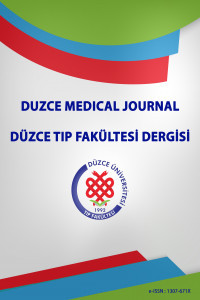COVID-19 Sürecinde Deliryum Olgu Sunumu ve Demansın Literatür Taraması
A Case Report of Delirium and Literature Review of Dementia in COVID-19 Process
___
- Wang H, Li T, Barbarino P, Gauthier S, Brodaty H, Molinuevo JL, et al. Dementia care during COVID-19. Lancet. 2020;395(10231):1190-1.
- Atkins JL, Masoli JAH, Delgado J, Pilling LC, Kuo CL, Kuchel GA, et al. Preexisting comorbidities predicting COVID-19 and mortality in the UK biobank community cohort. J Gerontol A Biol Sci Med Sci. 2020;75(11):2224-30.
- Kim H, Jhoo JH, Jang JW. The effect of telemedicine on cognitive decline in patients with dementia. J Telemed Telecare. 2017;23(1):149-54.
- Mao L, Jin H, Wang M, Hu Y, Chen S, He Q, et al. Neurologic manifestations of hospitalized patients with coronavirus disease 2019 in Wuhan, China. JAMA Neurol. 2020;77(6):683-90.
- Moriguchi T, Harii N, Goto J, Harada D, Sugawara H, Takamino J, et al. A first case of meningitis/encephalitis associated with SARS-Coronavirus-2. Int J Infect Dis. 2020;94:55-8.
- Aghagoli G, Gallo Marin B, Katchur NJ, Chaves-Sell F, Asaad WF, Murphy SA, et al. Neurological involvement in COVID-19 and potential mechanisms: A review. Neurocrit Care. 2020;[Epub ahead of print]. doi: 10.1007/s12028-020-01049-4.
- Nath A. Neurologic complications of coronavirus infections. Neurology. 2020;94(19):809-10.
- Abiodun OA, Ola MS. Role of brain renin angiotensin system in neurodegeneration: An update. Saudi J Biol Sci. 2020;27(3):905-12.
- Almeida-Santos AF, Kangussu LM, Campagnole-Santos MJ. The renin-angiotensin system and the neurodegenerative diseases: a brief review. Protein Pept Lett. 2017;24(9):841-53.
- Kuo C-L, Pilling LC, Atkins JL, Masoli JAH, Delgado J, Kuchel GA, et al. APOE e4 genotype predicts severe COVID-19 in the UK Biobank community cohort. J Gerontol A Biol Sci Med Sci. 2020;75(11):2231-2.
- Farrer LA, Cupples LA, Haines JL, Hyman B, Kukull WA, Mayeux R, et al. Effects of age, sex, and ethnicity on the association between apolipoprotein E genotype and Alzheimer disease. A meta-analysis. APOE and Alzheimer Disease Meta Analysis Consortium. JAMA. 1997;278(16):1349-56.
- Kotfis K, Williams Roberson S, Wilson JE, Dabrowski W, Pun BT, Ely EW. COVID-19: ICU delirium management during SARS-CoV-2 pandemic. Crit Care. 2020;24(1):176.
- Browne J, Edwards DA, Rhodes KM, Brimicombe DJ, Payne RA. Association of comorbidity and health service usage among patients with dementia in the UK: a population-based study. BMJ Open. 2017;7(3):e012546.
- Foley NC, Affoo RH, Martin RE. A systematic review and meta-analysis examining pneumonia-associated mortality in dementia. Dement Geriatr Cogn Disord. 2015;39(1-2):52-67.
- Fotuhi M, Mian A, Meysami S, Raji CA. Neurobiology of COVID-19. J Alzheimers Dis. 2020;76(1):3-19.
- Zhou F, Yu T, Du R, Fan G, Liu Y, Liu Z, et al. Clinical course and risk factors for mortality of adult inpatients with COVID-19 in Wuhan, China: a retrospective cohort study. Lancet. 2020;395(10229):1054-62.
- Brown EE, Kumar S, Rajji TK, Pollock BG, Mulsant BH. Anticipating and mitigating the impact of COVID-19 pandemic on Alzheimer's disease and related dementias. Am J Geriatr Psychiatry. 2020;28(7):712-21.
- Ford AH. Preventing delirium in dementia: Managing risk factors. Maturitas. 2016;92:35-40.
- Davies SJ, Burhan AM, Kim D, Gerretsen P, Graff-Guerrero A, Woo VL, et al. Sequential drug treatment algorithm for agitation and aggression in Alzheimer's and mixed dementia. J Psychopharmacol. 2018;32(5):509-23.
- Zambrelli E, Canevini M, Gambini O, D'Agostino A. Delirium and sleep disturbances in COVID-19: a possible role for melatonin in hospitalized patients? Sleep Med. 2020;70:111.
- Ferini-Strambi L, Salsone M. COVID-19 and neurological disorders: are neurodegenerative or neuroimmunological diseases more vulnerable? J Neurol. 2020;[Epub ahead of print]. doi: 10.1007/s00415-020-10070-8.
- Boots L, de Vugt ME, Van Knippenberg R, Kempen GI, Verhey FR. A systematic review of Internet‐based supportive interventions for caregivers of patients with dementia. Int J Geriatr Psychiatry. 2014;29(4):331-44.
- Moo LR, Gately ME, Jafri Z, Shirk SD. Home-based video telemedicine for dementia management. Clin Gerontol. 2020;43(2):193-203.
- Cuffaro L, Di Lorenzo F, Bonavita S, Tedeschi G, Leocani L, Lavorgna L. Dementia care and COVID-19 pandemic: a necessary digital revolution. Neurol Sci. 2020;41(8):1977-9.
- Hsu TJ, Tsai HT, Hwang AC, Chen LY, Chen LK. Predictors of non-pharmacological intervention effect on cognitive function and behavioral and psychological symptoms of older people with dementia. Geriatr Gerontol Int. 2017;17(Suppl 1):28-35.
- Acar T, Acıman Demirel E, Afşar N, Akçalı A, Akman Demir G, Alagöz AN, et al. The COVID-19 from neurological overview. Turk J Neurol. 2020;26(2):58-108.
- Ousset PJ, Vellas B. Viewpoint: Impact of the COVID-19 outbreak on the clinical and research activities of memory clinics: An Alzheimer’s disease center facing the COVID-19 crisis. J Prev Alz Dis. 2020;3(7):197-8.
- Alzheimer's Disease Research Enterprise in the Era of COVID-19/SARS-CoV-2. Alzheimers Dement. 2020;16(4):587-8.
- Balli N, Kara E, Demirkan K. The another side of COVID‐19 in Alzheimer’s disease patients: drug‐drug interactions. Int J Clin Pract. 2020;74(10):e13596.
- Korczyn AD. Dementia in the COVID-19 period. J Alzheimers Dis. 2020;75(4):1071-2.
- Yayın Aralığı: Yılda 3 Sayı
- Başlangıç: 1999
- Yayıncı: Düzce Üniversitesi Tıp Fakültesi
COVID-19 Pandemisi Sürecinde Uyku Polikliniğine Başvuru Nedeni: Uykusuzluk
Esra AYDIN SÜNBÜL, Rahşan KARACI, Füsun MAYDA DOMAÇ
COVID-19 Tanısında Laboratuvar Testleri
Şemsi Nur KARABELA, Kadriye KART YAŞAR
COVID-19 ve Romatizmal Hastalıklar
COVID-19 Hastalarında Myalji Sıklığı ve Kreatin Kinaz Düzeyleri ile İlişkisi
Nimet UCAROGLU, Özgecan KAYA, Dilcan KOTAN
COVID-19 Pandemisi Sürecinde Nörorehabilitasyonun Yönetimi
SARS-CoV-2 Enfeksiyonunda Nörolojik Bulguların Tanısal ve Prognostik Önemi
COVID-19 Sürecinde Deliryum Olgu Sunumu ve Demansın Literatür Taraması
Meryem Tuba SÖNMEZ, Tülin AKTÜRK, Hikmet SAÇMACI
Seyfettin ERDOĞAN, Durmuş Çağrı YILDIRIM, Ayfer GEDİKLİ
Diabetes Mellitus ve COVID-19 Salgını Hakkında Bir Olgu Sunumu
Hafize KIZILKAYA, Murat DEVECİ
Hemodiyaliz Hastalarında COVID-19 Toraks Bilgisayarlı Tomografi Bulgularının Değerlendirilmesi
Ömer Faruk ATEŞ, Erbil ARIK, Ogün TAYDAŞ, Hamad DHEİR, Fatih GÜNEYSU
